Agentura Stasi w PRL w czasach pierwszej „Solidarności”. Wstęp do dyskusji
The Stasi intelligence network in the People’s Republic of Poland in the early “Solidarity” period. Introduction to the debate
Author(s): Filip GańczakSubject(s): Christian Theology and Religion, Government/Political systems, Security and defense, Military policy
Published by: Instytut Pamięci Narodowej
Keywords: GDR; Polish People’s Republic; Stasi; intelligence; Polish United Workers’ Party; „Solidarity”;
Summary/Abstract: Until recently, researchers have believed that in the eighties Poland was strongly infiltrated by the East German intelligence – the Ministry for State Security (MfS) of the German Democratic Republic (GDR), commonly known as the Stasi. However, latest scientific publications seem to suggest that the East German grip was not quite as strong. The Stasi did in fact make efforts to direct more agents to the People’s Republic of Poland after August 1980. An operational group was established in Warsaw. The central office of the MfS and its local units developed their networks of secret informers in Poland, primarily made up of citizens of the GDR with ties to Poland and the Poles. Along with the standard recruitment of human agents, efforts were made to establish and maintain both official and unofficial contacts with representatives of the Polish government and other state institutions. Officers and secret informers of the MfS would often acquire valuable information directly from the Polish United Workers’ Party, the Polish Army, the Catholic Church or the Independent and Self-Governing Trade Union “Solidarity” (NSZZ “Solidarność”). Still, these efforts weren’t accompanied by adequate analytical studies of the situation in Poland – those available were often repetitive and overly ideological.
Journal: Pamięć i Sprawiedliwość.
- Issue Year: 30/2017
- Issue No: 2
- Page Range: 451-465
- Page Count: 15
- Language: Polish

